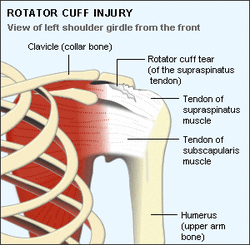 Rotator cuff tears are a fairly common injury. The rotator cuff is the name of the tendons that surround your shoulder joint to stabilize your shoulder and initiate movement. The rotator cuff allows your shoulder to move in different ways (such as lifting movements or rotating movements), and it also shoulder in its shoulder socket.
Rotator cuff tears are a fairly common injury. The rotator cuff is the name of the tendons that surround your shoulder joint to stabilize your shoulder and initiate movement. The rotator cuff allows your shoulder to move in different ways (such as lifting movements or rotating movements), and it also shoulder in its shoulder socket.
Rotator cuff tears can be the result of a single traumatic injury or event, or can result from prolonged use. Typical athletes that often get rotator cuff tears include baseball players, tennis players, or rowers.
In addition, many who work in over head jobs can also get symptomatic rotator cuff tears requiring treatment
Symptoms Associated with Rotator Cuff Tears
People with rotator cuff tears often complain of pain and/or weakness when lifting, rotating the arm or overhead activities. Atrophy of the muscles around the shoulder is often a sign of a rotator cuff tear. Sometimes people feel a crackling sensation when moving their shoulder.One of the most common symptoms is pain at night when lying on the shoulder
Treatment Options
Non-surgical treatments including rest, limited overhead activity, and activity modification. Anti-inflammatory medication or a cortisone injection may be recommended. Often times there are specific strengthening exercises that I can recommend that you can work on at home or in consultation with one of our physical therapists.
Surgery is often recommended in acute tears to allow full muscular recovery, and occasionally in chronic tears which fail to recover from a full course of rehabilitation.
The type of surgery recommended depends on the size, shape and location of the tear. Partial tears may require only a trimming or smoothing procedure, whereas complete tears in the thickest part of the tendon are often repaired by suturing the two sides of the tendon back together. any of these tears can be treated with arthroscopic techniques which allow a shorter duration of pain and rehabilitation.
If you have persistent shoulder pain, I recommend that you come for an evaluation. Many times you can learn simple exercises that can substantially limit the pain you are consistently experiencing in your shoulder. If you are one of the few that require surgery, I would be happy to be your surgeon and will work with you until you have achieved your ultimate goal – full and painless shoulder motion.
